Background information & problem statement
The movie industry is comprised of establishments whose core business entails the exhibition of motion pictures and theatres. The industry has experienced extensive evolution over the past decade. For example, technological innovation has led to the emergence of different types of movie formats such as digital formats. The industry is experiencing a challenge due to the high rate of piracy and change in consumer behaviours as evidenced by the increase in demand for high quality products and services. Reports show that the movie theatre industry has been affected adversely by the slow economic recovery and decline in consumer spending arising from the 2008 global economic recession (Wright and Larsen 169).
In addition to these challenges, the industry is characterised by a high degree of concentration and market dominance by large players such as Cinemark Holdings Incorporation, Regal Entertainment Group, and AMC Entertainment Group. The industry players are adopting the concept of mergers and acquisition in an effort to achieve market competiveness. For example, in 2006, AMC Entertainment merged with Loews Entertainment in an effort to attain an optimal market position. Loews Entertainment had established 415 theatres in over 11 countries. Similarly, Cinemark completed its process to acquire Century Theatres Incorporation in 2006. The above industry changes indicate that the long-term survival of firms in the movie industry is dependent on their effectiveness in strategic management. One of the functional areas that the industry players should focus on relates to marketing.
Research purpose
The purpose of this research paper was to conduct a study on how firms in the movie theatre industry can achieve optimal market performance through market segmentation.
Relevance of the study
Findings of this study will be of great importance to firms in the movie theatre industry. The study will provide operators in the industry with insight on how to be effective in attracting and retaining customers through market segmentation. For example, movie theatre operators will appreciate the importance of integrating non-price and price factors in their market segmentation process. Therefore, the appreciation and adoption of the study’s findings will enhance the industry players’ competitive advantage.
Development of an approach to the problem
Research question
The study was guided by one main research question as outlined below.
- How can market segmentation be implemented in attracting and retaining movie theatre viewers?
Theoretical framework
The demand for a product or service varies across different consumer groups depending on disparate aspects like age, gender, and economic status among others. Subsequently, the significance of understanding the prevailing market dynamics cannot be underestimated. Aziz and Nas define market segment as “a subgroup of people or organisations sharing one or more characteristics that cause them to have similar product needs” (44). Market segmentation is increasingly becoming one of the fundamental elements in contemporary marketing. However, the attainment of competitiveness through market segmentation is subject to the effectiveness with which the various market segmentation dimensions are taken into account.
Various market segmentation dimensions guide this research paper as the theoretical framework. The paper has taken into account the various market segmentation dimensions as illustrated by the framework below. The model illustrates the various factors that influence the consumers’ purchasing decision.
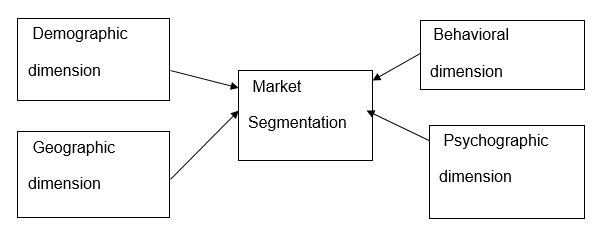
Research design formulation
The study purpose of this study was to examine how firms in the movie theatre industry can adopt the concept of market segmentation in order to market their products to viewers. Thus, the study was exploratory in nature. In order to achieve the study’s objective, the researcher adopted mixed research design, which entails the integration of qualitative and quantitative research designs. The adoption of the mixed research design is informed by the need to increase the credibility and relevance of the study’s findings.
Quantitative research design enabled the researcher to be effective in conducting a comprehensive evaluation on the significance of market segmentation in developing competitive advantage through effective customer attraction and retention. On the other hand, qualitative research design played a fundamental role in the data collection and analysis process. Deming (45) argues that qualitative data collection enables researchers to gather substantial and relevant amount of data from the field. Using quantitative research techniques enabled the researcher to condense the research findings, hence simplifying the data analysis process.
Effective identification of the target population, which entails a universal set of all the objects under consideration, is one of the critical elements that researchers should take into account. Effective targeting of the study population determines the extent to which the researcher obtains credible data from the field. In this study, the target population is comprised of movie theatre enthusiasts. However, the researcher must select a sample from the target population in order to be effective and efficient in conducting the study. Deming (23) defines a sample as a subset of the total population. Simple random sampling technique was adopted in selecting the respondents.
Simple random sampling technique was selected in order to eliminate bias in selecting the respondents. Subsequently, the researcher was successful in eliminating bias based on the respondents’ demographic characteristics. The sampling technique enabled the study to be manageable. A sample of 100 movie theatre fans was selected from different cities across the United Arab Emirates. The researcher assumed that the respondents of the selected respondents would represent the general market view.
Data collection
The quality of data collected has a significant impact on the credibility of a study’s findings. In an effort to improve the credibility of the research, the researcher collected data from primary sources. The decision to utilise the primary sources arose from the need to obtain data from the natural settings. Two main data collection instruments, which include questionnaires and interviews, were used.
The researcher ensured that the questionnaires focused on understanding the target consumers’ purchase behaviours with specific reference to the consumption of movie theatre services. The questionnaires were both open-ended and close-ended in nature. Open-ended questionnaires enabled the researcher to gather a wide range of information. On the other hand, the close-ended questionnaires enabled the researcher to obtain definite answers.
The questionnaires were designed effectively in order to improve the rate of response from the research participants. One of the aspects that the researcher took into account in the questionnaire designing process was ensuring that the questions asked were simple and clear. Furthermore, the questionnaires were reviewed before being issued to the respondents in order to ensure that the questions were not ambiguous. The interviews were collected through telephone in order to minimise the cost. On the other hand, the questionnaires were distributed electronically through emails.
Data preparation and analysis
The research adopted Microsoft Excel in analysing the data collected. The choice of Microsoft Excel arose from the need to be effective and efficient in analysing and presenting the research findings. Microsoft Excel is an effective data analysis tool because of its capacity to present data using different formats such as bar graphs, tables, pie charts, and percentages. Subsequently, the researcher was in a position to condense the voluminous and descriptive data collected from the field. Data preparation and analysis was also conducted by utilising the 4-point Likert scale. The Likert scale enabled the researcher to condense the qualitative responses using the 4-point scale.
Report preparation and presentation
The findings collected showed that movie theatre fans are characterised by demographic characteristics. For example, the data collected shows that movie theatre customers vary depending on their age, nationality, gender, and occupation.
Forty five percent [45%] of the respondents selected were female while 55% were male, which shows that attendance of movie theatre is more prevalent amongst the male gender.
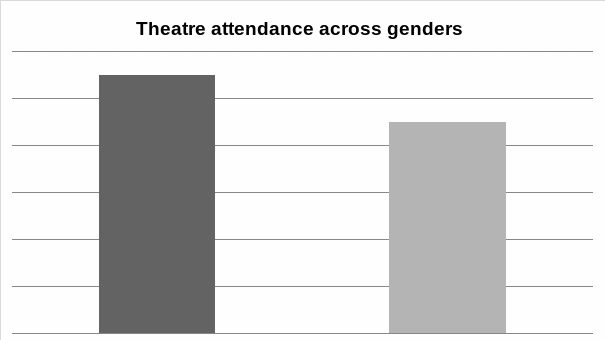
The study also shows that movie theatre fans include individuals in different age groups as illustrated by the graph below.
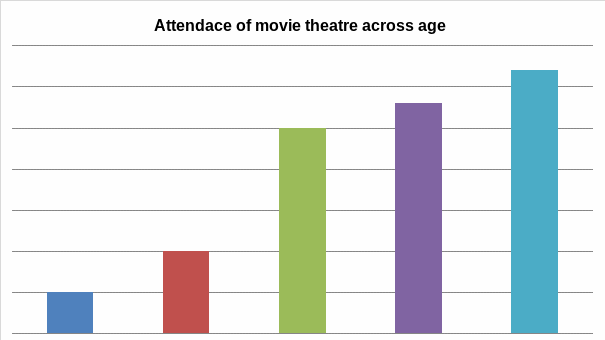
The respondents response varied depending on their occupation as illustrated by the graph below.
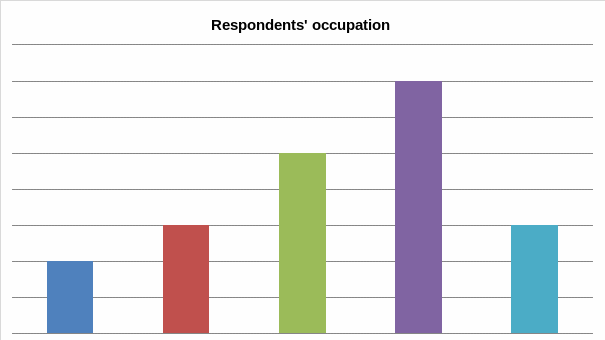
A further analysis showed that attendance of movie theatres varies based on nationality amongst the selected respondents as illustrated below.
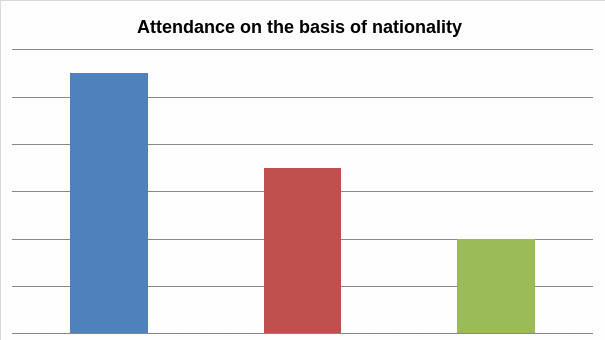
The respondents’ opinions on the consumption of movie theatre services varied. Seventy five percent (75%) of the respondents cited going to the movie theatres to be a very important component of spending their leisure time. On the other hand, 25% said that going to the movie theatre is relatively important. Additionally, the study shows that the attendance of movie theatre amongst the respondents varies depending on their occupation. Attendance is more prevalent amongst the employed [35%] and graduates [25%] as compared to high school [10%], and business owners [15%]. Some of the reasons that explain this variation in the rate of attendance amongst these groups of respondents relate to their income level and amount of time available. High school and undergraduate students have a relatively lower disposable income as compared to the employed consumers and business owners. Additionally, business owners, high school students, and undergraduates have minimal amount of time due to the nature of work and education system.
In addition to the above issues, the study also showed a trend whereby movie theatre fans are increasingly appreciating non-price issues in selecting their preferred movie theatre. The respondents cited a number of issues, which contribute to the overall ambience of the theatre. Some of the factors cited include the availability of refreshments such as soft drinks and food items, comfortable chairs, clean restrooms, quality sound system, size of screen, and auditorium type seating. However, their opinion varied as illustrated in the pie chart below.
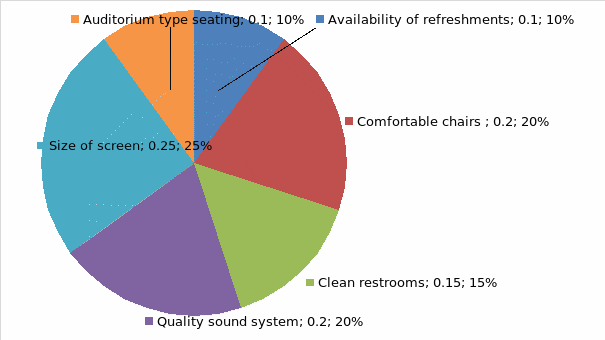
The study also shows that the respondents’ behaviour with regard to search for information on movies playing at the movie theatres varies. The chart below illustrates the respondents’ opinions.
The consumers’ opinion on the preferred method of purchasing the movie ticket varied as indicated by the chart below.
The above findings show that the consumer market is characterised by diverse consumer groups. Additionally, their purchase decision is influenced by diverse factors.
Conclusion and recommendations
The study shows that it is imperative for firms in the movie industry to adopt effective marketing practices. One of the issues that they should consider relates to market segmentation. However, their ability to develop competitive advantage through market segmentation will be subject to the effectiveness with which they take into account the various market segmentation dimensions. One of the dimensions that movie theatre firms should consider relates to the behavioural dimension, which takes into account the target consumers’ attitude towards the product or service being provided. Some of the behavioural variables that the firms should take into account include the consumers’ status, usage-rate, loyalty status, occasions, and the sought benefits.
Additionally, the industry players should incorporate psychographic segmentation concept by assessing the target consumers’ lifestyle, interests, personality, and opinion. By taking into account these psychographic market segmentation variables, the industry players will be in a position to market their products to diverse customer groups. Additionally, they will be in a position to improve ambience within the theatre, for example, by integrating big screens, quality sound systems, and comfortable seats.
Considering the intensity of competition in the movie theatre industry, it is fundamental for the industry players to expand into the international market. However, this goal can only be achieved if the firms develop a comprehensive understanding of their target market by considering the prevailing geographical variables. This move will increase the effectiveness with which the firms are effective in satisfying the market demand. Additionally, geographic market segmentation will ensure that the firms are effective in designing their marketing communication processes. For example, the firms will be in a position to avoid content that might be offensive to a particular geographic market.
Findings of the study show that consumers are inclining towards digital technology. Therefore, it is imperative for firms in the industry to integrate emerging digital technology. For example, the industry players should implement big digital screens in their theatres in order to attract customers. Moreover, the firms should integrate online marketing practices in a bid to create awareness to a large number of customers. One of the ways through which this goal can be achieved is by adopting social media in creating awareness regarding the most recent movies playing at their theatres. Subsequently, there is a high probability of the firms experiencing an increment in their revenues.
Furthermore, adopting digital technology such as online purchasing in their marketing segmentation processes will also improve the effectiveness with which the firms satisfy the target customers’ demand for customers will be in a position to purchase movie tickets conveniently.
Works Cited
Aziz, Samer, and Zekeriya Nas. “Demographic segmentation and its effect on customer satisfaction.” International Journal of Contemporary Business Studies 4.2 (2013): 44-53. Print.
Deming, William. Sample design in business research, New York: Wiley, 2002. Print.
Wright, Newell, and Val Larsen. “Capital investment and market segmentation: making movies for Mormon audiences.” Marketing Education Review 24.2 (2014): 167-172. Print.